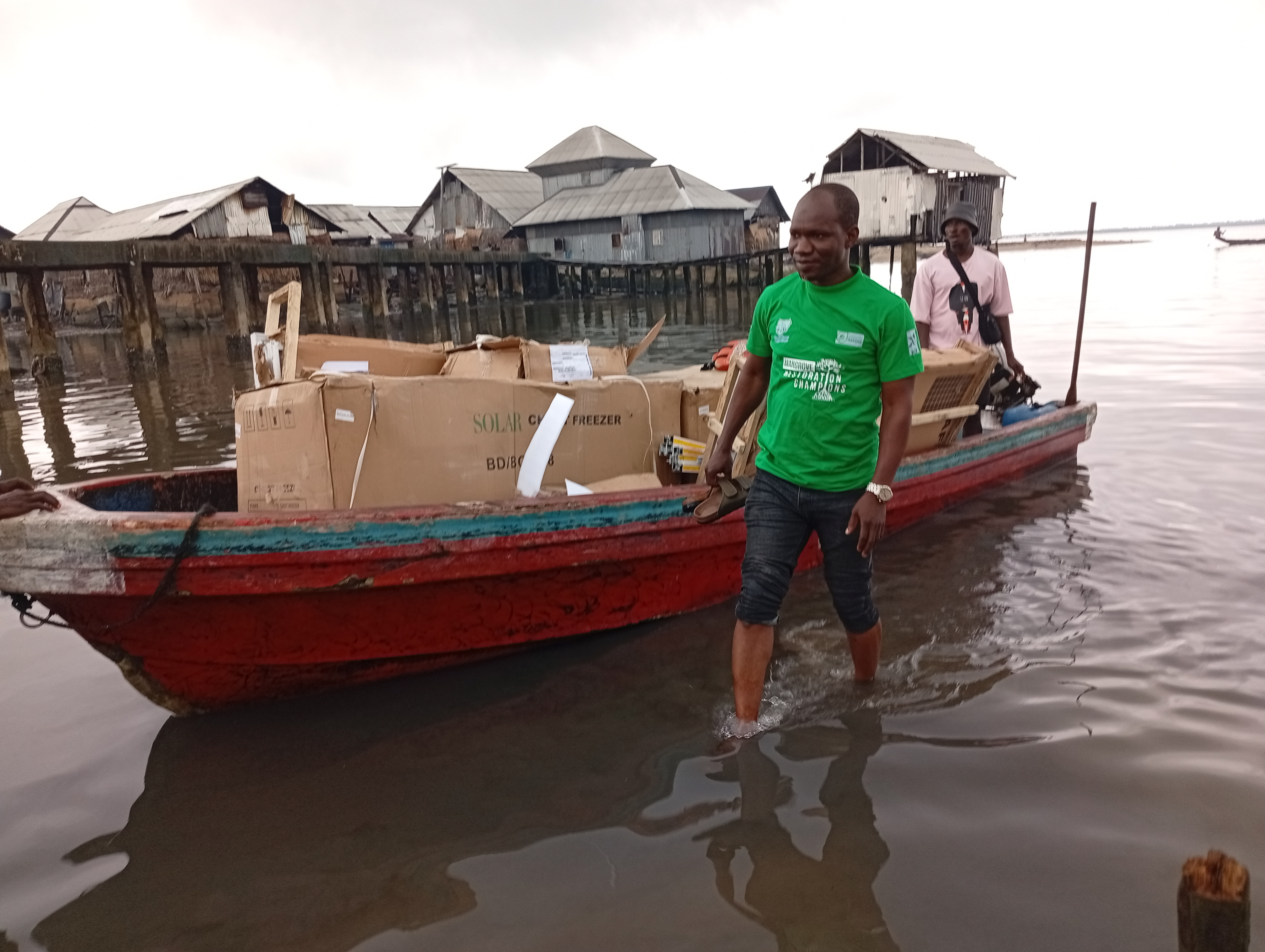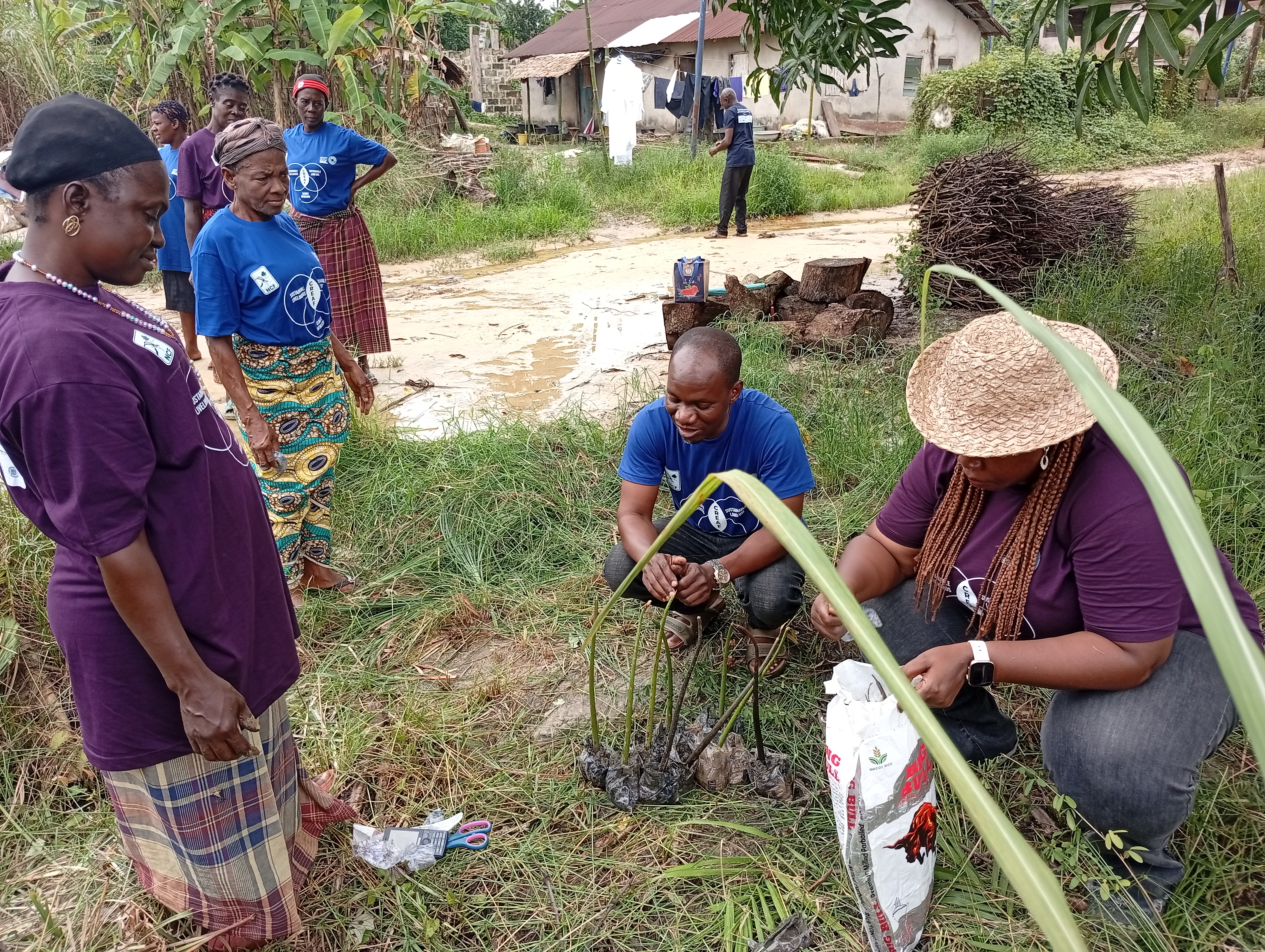Sustaining Seas, Sustaining Lives: NCF Brings Coastal Communities Together for Conservation

Solar-powered freezers ferried by boat, providing clean-energy cold storage for fish. © NCF
For generations, the coastal communities of Idoluwo (Lagos State), Ayetoro (Ondo State), and Oyorokoto in Andoni (Rivers State) have lived by the rhythm of the sea. Fishing is more than a livelihood; it is a source of food, culture, and identity.
But in recent years, this way of life has come under threat. Overfishing, mangrove logging, sand dredging, flooding, and coastal encroachment are depleting fish stocks and destroying fragile habitats. As a result, local livelihoods are shrinking, while migratory waterbirds along the East Atlantic Flyway, a global lifeline for millions of species, face steep population declines.
In response, the Nigerian Conservation Foundation (NCF), with support from the Climate Resilient East Atlantic Flyway (CREAF) Project, led by me, launched a community-driven initiative between July and August 2025. The project combined training, renewable energy solutions, and mangrove restoration, helping communities build resilience for both people and nature.
Building Skills for Sustainable Fishing
A total of 200 fisherfolk (116 men and 84 women) participated in the workshops across the three communities. Participants ranged from young fishers in their late teens to elders in their 80s, reflecting the intergenerational reliance on fishing.
The sessions introduced practical techniques that communities can apply immediately. Fishers were encouraged to use selective gear, such as cast nets or rod-and-reel, to avoid catching juvenile fish, and to observe fishing breaks during breeding seasons so stocks can recover naturally. They also learned the importance of protecting natural nurseries like mangroves, while drafting and enforcing community bylaws against destructive practices such as poisoning and illegal trawling. Reducing waste disposal into rivers and creeks was emphasized as a key step in protecting water quality, and participants were encouraged to form cooperatives to strengthen their collective voice and attract greater support.
“We never thought about taking breaks during breeding seasons. Now we see how resting the waters will help us catch more fish in the future,” said a fisher from Ayetoro.
Solar Power, Brighter Futures
One of the biggest challenges facing these communities is post-harvest fish loss. Without reliable storage, fisherfolk often sell their catch at low prices or watch it spoil, forcing them to overfish just to make ends meet.
To tackle this, NCF donated six solar-powered freezers (each with a capacity of 538 litres), two in each community. These off-grid systems are already transforming livelihoods. Fishers can now preserve their catch for days, sell at better prices, and reduce the pressure to overexploit local waters. The solar technology also provides clean energy in off-grid communities, reducing the demand for mangrove firewood and giving ecosystems a chance to recover.
“With the solar freezer, we no longer rush to sell fish cheaply. We can keep it fresh, earn more, and protect our mangroves,” said a fisherwoman in Ayetoro, Ondo state.
Restoring Mangroves, Removing Invaders
Mangroves are nature’s guardians: they act as nurseries for fish, buffers against storms, and habitats for migratory birds. But many wetlands in Nigeria are overrun by Nypa fruticans, an invasive palm that displaces native mangroves and undermines biodiversity.
Through the project, 12 community members were trained in mangrove restoration techniques such as propagule collection, nursery establishment, and planting. In addition, 10 participants joined mapping exercises to identify areas dominated by Nypa fruticans for future restoration work. Pilot restoration activities began in Unyeada (Andoni, Rivers State), giving communities hands-on experience in bringing mangroves back to life.
“Now we understand that mangroves are not just trees, they are life for our fish and protection for our homes,” said one trainee.

Women at the Center
Women played a pivotal role in this initiative, making up 44% of participants. Their inclusion was intentional, recognizing their importance in fish processing, preservation, and household food security. Women took part in fishing workshops, helped manage the solar-powered freezers, and joined restoration efforts, ensuring that conservation benefits reach families and strengthen community resilience.
“Women are the backbone of fisheries in Nigeria. By equipping them with skills and resources, we multiply the benefits for families, communities, and ecosystems,” emphasized Dr. Joseph Onoja, NCF’s Director General.
Stronger Communities, Stronger Flyways
The workshops sparked enthusiasm across all three communities and left participants better equipped to balance conservation with livelihoods. It delivered tangible results: 200 fisherfolk were trained in sustainable practices, six solar-powered freezers were deployed to reduce post-harvest losses, and 12 community champions gained hands-on skills in mangrove restoration. In addition, 10 participants joined invasive species mapping exercises, and communities across all three sites reported stronger awareness of the East Atlantic Flyway and its global ecological importance.
From Idoluwo to Ayetoro to Oyorokoto, communities are stepping forward as co-owners of conservation, protecting habitats, improving food security, and building resilience to climate change.
As I summed it up:
Sustainability is not only about protecting nature, it is about protecting people. When communities thrive, biodiversity thrives too.
Each mangrove restored and each sustainable catch is a step toward a future where fisherfolk prosper, habitats are safeguarded, and migratory birds continue to fill the skies along their ancient routes. It shows that when local communities are empowered, they can protect their way of life while also safeguarding the wonders of nature for the world.
